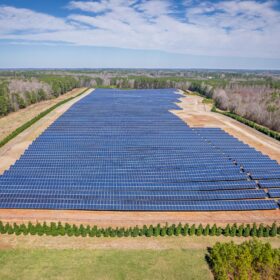Destroy the industry to save it? Another report warns of Section 201 case’s potentially devastating effects
GTM Research’s latest report predicts a 50% to 60% overall reduction to solar installations if trade action is taken, with the utility-scale sector taking the most significant hit.
Trump now says SOLAR will pay for the Mexican wall
First it was Mexico. Then it was the U.S. taxpayer (reimbursed by Mexico). Now President Trump says he’s going to cover the wall in solar panels – generating energy and paying for itself.
Louisiana retroactively fixes solar tax credit
The state’s house and senate have passed a bill to ensure that PV system owners who installed solar by the end of 2015 actually get the tax credit they were promised.
DOE grid study release delayed until July
Secretary Perry’s promised study of whether renewables are shutting down baseload coal and nukes and potential impacts on reliability will have to wait until July.
A new approach to unlocking the corporate solar market without virtual net metering
In this guest post for pv magazine USA, Soltage Senior VP Marc Miller looks at the Contract for Differences (CfD) model as a way to further expand corporate adoption of solar, particularly in states that do not have Virtual Net Metering policies.
Cheap gas and renewables are making merchant power untenable (w/ charts)
A new report by Power Research Group and Wilkinson Barker Knauer finds that cheap natural gas, wind and solar make it impossible for merchant plants to recover invested capital, and threaten the basic operation of wholesale power markets.
Business as usual: Energy Department awards $32 million in small-business grants
Despite having the sword of Damocles hanging over the Office of Energy Efficiency and Renewable Energy (EERE), it is still doing its job – encouraging small businesses to innovate in the clean-energy economy so that if the industry is ever no longer under siege, it will not have fallen irreversibly behind the rest of the world.
Optimism and concern at the REFF Wall Street conference
While there were many good indicators at ACORE’s 14th REFF Wall Street conference, there are worries around the Suniva Section 201 trade case.
PURPA finds itself under siege in Wyoming
Rocky Mountain Power is asking the Wyoming Public Service to slash severely the reimbursement rates it is required to pay to qualifying facilities under the 1978 law, arguing falling solar and natural gas prices mean those rates are too high to sustain long term. (READ THE FULL FILING HERE)
Nevada Governor Sandoval vetoes RPS increase, community solar bills
After authorizing the return of net metering earlier in the week, Sandoval quietly killed two important pieces of renewable energy legislation.














